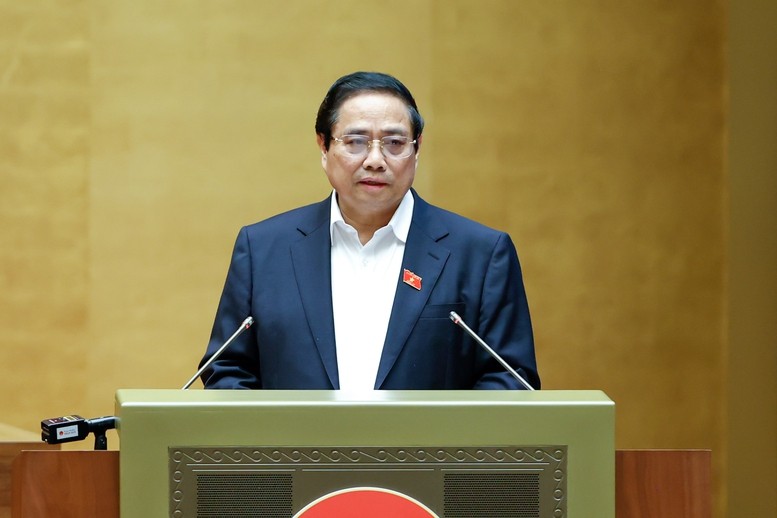
The Prime Minister said that Resolution 68 has clearly stated 5 breakthrough guiding viewpoints and 8 groups of tasks and solutions to solve the most important and urgent issues for private economic development today.
On the morning of May 18, the Politburo and the Secretariat held a national conference to disseminate and implement Resolution No. 66-NQ/TW dated April 30, 2025 of the Politburo on innovation in law-making and enforcement to meet the requirements of national development in the new era and Resolution No. 68-NQ/TW dated May 4, 2025 of the Politburo on private economic development.
At the conference, Comrade Pham Minh Chinh, Politburo member and Prime Minister, presented the Topic on the core content of Resolution 68-NQ/TW dated May 4, 2025 of the Politburo on developing the private economy and the Government's Action Plan to implement the Resolution.
The Prime Minister first emphasized that Resolution 68 was developed and issued very quickly under the direction of General Secretary To Lam. After Resolution 68 was issued on May 4, within 13 days, the National Assembly and the Government issued 3 resolutions to institutionalize and implement it. This shows timely and quick preparation but also very thoughtful and quality, with a very urgent and serious working spirit, under the direction and attention of the Politburo and the General Secretary.
The Prime Minister focused on presenting 5 main groups of contents: (1) Overview of the current situation of the private economic sector; (2) Core contents of Resolution 68-NQ/TW of the Politburo; (3) Main contents of Resolution No. 138/NQ-CP dated May 16, 2025 of the Government promulgating the Government's Action Plan; (4) Key contents of Resolution No. 198/2025/QH15 dated May 17, 2025 of the National Assembly on a number of special mechanisms and policies for private economic development and Resolution No. 139/NQ-CP dated May 17, 2025 of the Government on the Plan to implement Resolution No. 198/2025/QH15 of the National Assembly; (5) Implementation organization.
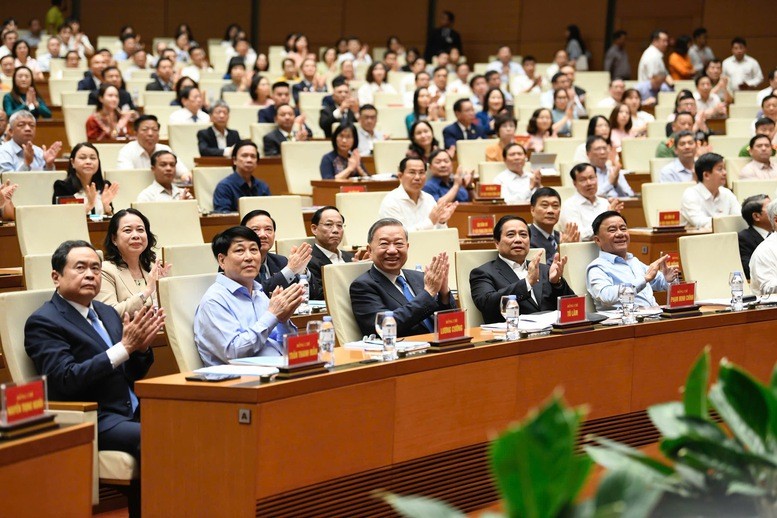
Private economy plays an increasingly important role
Overviewing the current situation of the private economic sector , the Prime Minister spent a lot of time analyzing the Party and State's policies on private economic development; achieved results; shortcomings, limitations and causes; requirements for breakthrough policies for private economic development.
The Prime Minister said that over the past nearly 40 years, since the Doi Moi, the Party and State's viewpoints, guidelines, policies and strategies on private economy have been clearly demonstrated in Party Congress documents, Resolutions of the Central Executive Committee, Politburo, Laws and Resolutions of the National Assembly, Decrees and Resolutions of the Government specifying the Party's guidelines and policies on private economy development.
The role of private economy is increasingly important, clearly demonstrated through the Resolutions of Party Congresses.
The 6th Party Congress (1986) affirmed the existence of private economy associated with multi-sector economy, clearly stating "using private capitalist economy in some industries and professions".
The 7th Party Congress (1991) allowed private enterprises to "develop without restrictions on scale and area of operation in industries and professions that are not prohibited by law".
The 8th Party Congress (1996) acknowledged the role of the private economy: "The private capitalist economy has the ability to contribute to national construction."
The 9th Party Congress (2001) had a more open view of the private economy: "encouraging the widespread development of the private capitalist economy in production and business sectors that are not prohibited by law."
The 10th Party Congress (2006) identified the important role of private enterprises and required: removing all barriers, creating a favorable business environment for all types of private enterprises to develop without limits on scale in all industries and fields that are not prohibited by law.
The 11th Party Congress (2011) clearly defined the role and position of the private economy and required "perfecting mechanisms and policies to strongly develop the private economy to become one of the driving forces of the economy".
The 12th Party Congress (2016) and the 13th Party Congress (2021) affirmed and emphasized "perfecting mechanisms and policies to encourage and facilitate the strong development of the private economy in most economic sectors and fields, becoming an important driving force of the economy".
The Prime Minister said that the Central Executive Committee and the Politburo have issued many policies and guidelines for the development of the private economy, notably Resolution No. 14-NQ/TW dated March 18, 2002 of the 5th Central Conference, Session IX "On continuing to innovate mechanisms and policies, encouraging and facilitating the development of the private economy"; Resolution No. 10-NQ/TW dated June 3, 2017 of the 5th Central Conference, Session XII on "Developing the private economy into an important driving force of the socialist-oriented market economy"; Resolution No. 41-NQ/TW dated October 10, 2023 of the Politburo on "Building and promoting the role of Vietnamese entrepreneurs in the new period".
The legal system is increasingly being improved on the basis of concretizing the Party's policies, guidelines, viewpoints and orientations, creating a unified and favorable legal framework for the development of the private economy, ensuring equal freedom of business.
Since 2017, the Government has submitted to the National Assembly nearly 60 laws, more than 40 resolutions and ordinances, and 17 new-generation free trade agreements; the Government has issued about 1,000 decrees related to the private economy.
From 2021 to now, the private economic sector has faced many difficulties due to the impact of the COVID-19 pandemic, global economic growth has recovered slowly and has many potential risks. The Government has submitted to the National Assembly and the National Assembly Standing Committee to issue many policies and solutions to support businesses, cooperatives, business households and workers. The policies to support businesses are very timely and relatively comprehensive with policies on reducing, extending, and deferring taxes, fees, charges, land rents, debt forgiveness, debt deferral, etc.
At the same time, the Government has issued many projects, programs and plans related to the development of private economy in various fields (typically the Project on developing human resources for digital transformation; Program to support private sector enterprises in sustainable business; National trade promotion program, Program on developing supporting industries...).
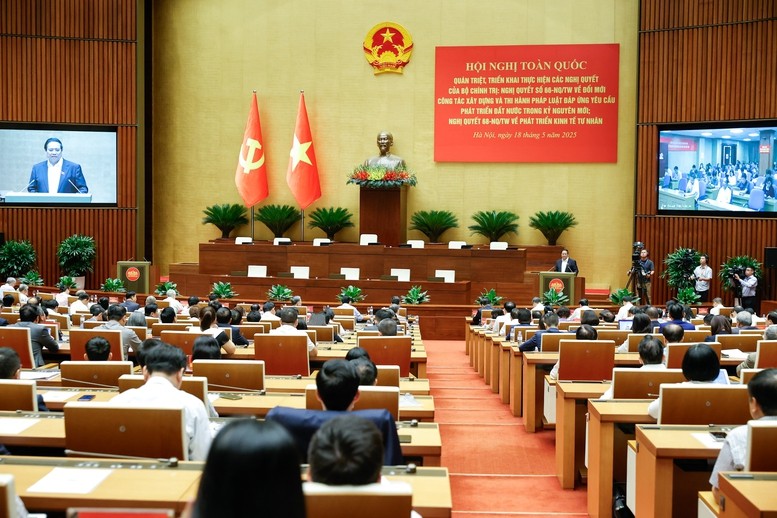
Regarding the results achieved, the Prime Minister assessed that the development process of the private economic sector over the past nearly 40 years can be summarized into 5 stages: (1) Stage 1986 - 1999: formation and recognition; (2) Stage 2000 - 2005: Prosperity with the Enterprise Law; (3) Stage 2006 - 2015: Integration and expansion; (4) Stage 2016 - 2024: Startups boom and become an important driving force in economic development; (5) Stage from 2025 onwards: Orientation to develop the private economic sector to become the most important driving force of the national economy.
Giving a general assessment of the results and contributions of the private sector in the process of innovation, integration and development, the Prime Minister stated: The private sector has continuously developed, affirming its position as an important driving force of the economy; an effective channel for mobilizing social resources for development investment; making an important contribution to promoting economic growth, increasing state budget revenue; creating jobs, livelihoods, income, improving people's lives, ensuring social security; promoting international integration; contributing to the development of science and technology, innovation, digital transformation; making an important contribution to the cause of national construction, defense and development.
Regarding some outstanding results of the private economy, the Prime Minister said that the number of established enterprises increased sharply, from about 5,000 enterprises in 1990 to 50,000 enterprises in 2000, and 200,000 in 2005 (40 times more after 15 years); to date, there are nearly 1 million enterprises operating in the economy.
The private sector has maintained a fairly high growth rate and is the sector with the largest contribution to the economy, accounting for about 50% of GDP. From 2016 to present, the growth rate of the private sector has reached about 6-8%/year, higher than the average growth rate of the economy.
The private economic sector makes a very important contribution to job creation and promoting economic restructuring, especially in rural and disadvantaged areas. In the period 2017-2024, the private economic sector employs an average of more than 43.5 million workers, accounting for more than 82% of the total number of employed workers in the economy.
The proportion of private economic investment capital in total social investment capital increased rapidly, from 44% in 2010 to 56% in 2024; contributing more than 30% of total state budget revenue, about 30% of total import-export turnover.
KTTN is a dynamic area in technological innovation, product and service creation. Start-ups and innovative businesses are increasing rapidly, from 1,500 startups in 2015 to about 4,000 startups in 2024. Many large corporations and businesses are forming, developing, and reaching regional and international levels.
The group of entrepreneurs is growing stronger and stronger, the entrepreneurial spirit, the spirit of innovation and the desire to rise up are increasingly stronger; especially, even in difficult times, natural disasters, epidemics, businesses and entrepreneurs still strive to maintain production and business activities, demonstrating social responsibility to the community.
In addition, despite its many important contributions, the private economic sector still has shortcomings and limitations. The private economic development target set out in Resolution 10-NQ/TW in 2017 (reaching 1.5 million enterprises and contributing 55% of GDP by 2025) has not yet been achieved.
Nearly 98% of private enterprises (PEs) are small and medium-sized (SMEs), micro-sized (nearly 70% micro-sized), with limited competitiveness, operational efficiency, and management skills; labor productivity is lower than that of FDI enterprises and state-owned enterprises; the proportion of PEs participating in the supply chain of FDI enterprises is low (only about 21%).
The average rate of operating enterprises will reach about 10 enterprises per 1,000 people by 2024, lower than other countries in the region. The rate of enterprises withdrawing from the market is increasing, reflecting the difficult situation due to adverse fluctuations in the international and domestic situation.
Access to resources is still difficult, especially in terms of finance, credit, land, high-quality human resources, especially for SMEs (accounting for nearly 98% of the number of enterprises but accessing less than 20% of total outstanding credit). Private enterprises account for less than 10% of total stock market capitalization.
Connections between private enterprises, between private enterprises and state-owned enterprises and FDI enterprises are still limited (only 18% of enterprises have connections to the global value chain, of which large enterprises account for 62%, the rest are small and medium enterprises).
Some private enterprises do not strictly comply with the law, information is not transparent, lack strategic vision; business ethics and culture are still limited (unhealthy competition, production of counterfeit goods, poor quality goods, contract violations, etc.). Some private enterprises also participate in smuggling, tax evasion, market manipulation, hoarding, price gouging, etc.
Through practical leadership, direction and administration, the Prime Minister pointed out fundamental shortcomings: Awareness of private enterprises is still limited, viewpoints are not open; leadership and direction are still inadequate; organization of implementation of laws, mechanisms and policies on private enterprises is not really timely and effective; a part of private enterprises are not really proactive, flexible, self-reliant, self-reliant and striving to improve.
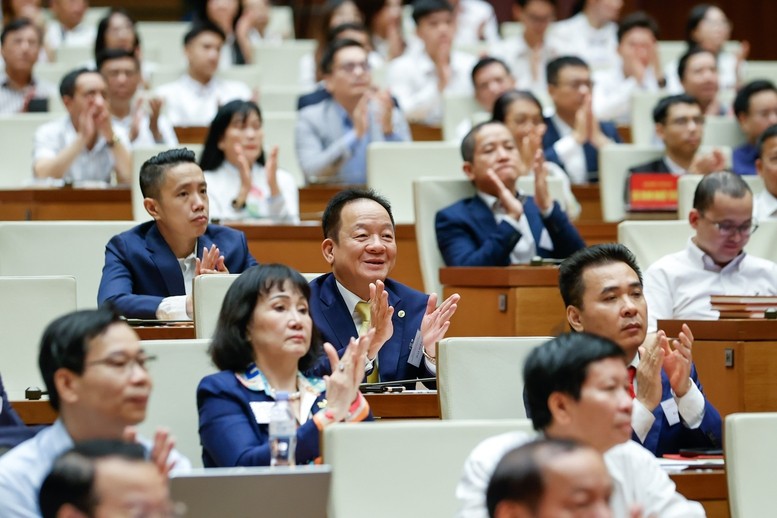
Analyzing the causes of the existing problems and limitations, the Prime Minister said that Vietnam is still a developing country, the economy is in transition, the economic scale is still modest, and resilience is limited. Institutions and laws are still "bottlenecks of bottlenecks". Administrative procedures are still entangled; Vietnam's business environment index in 2023 ranked 70/190 countries, lower than some countries in the region.
Some unnecessary and unfeasible business conditions have not been abolished or amended in a timely manner; investment and business procedures in some industries and fields are still complicated and lack transparency; some policies to support private enterprises are difficult to implement (such as supporting investment in research and development, tax incentives, encouraging business households to transform into enterprises, etc.).
The internal capacity of the private economy is still limited, especially in terms of capital, management, application of science and technology, digital transformation, and application of new business models such as green economy, digital economy, and circular economy.
The thinking and awareness of a number of cadres and civil servants still strongly reflect the "ask - give" mentality; there is still a lack of responsibility, harassment, abetting negativity, group interests, corruption, and waste.
Briefly, the Prime Minister said that the development of the private economy still faces many difficulties due to subjective and objective reasons, but the main cause is subjective, from awareness to orientation, implementation organization, state management, the issue of summarizing and honoring the private economy... although there have been many efforts, it is still not commensurate with the potential and development of the private economy sector and not commensurate with our wishes.
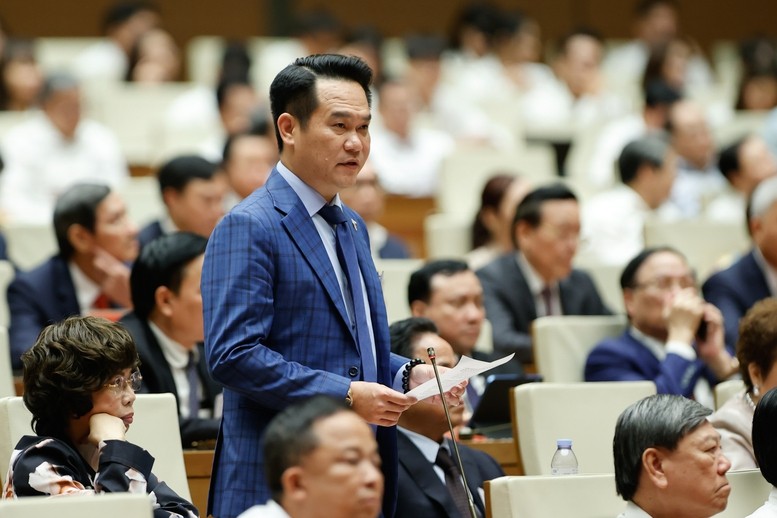
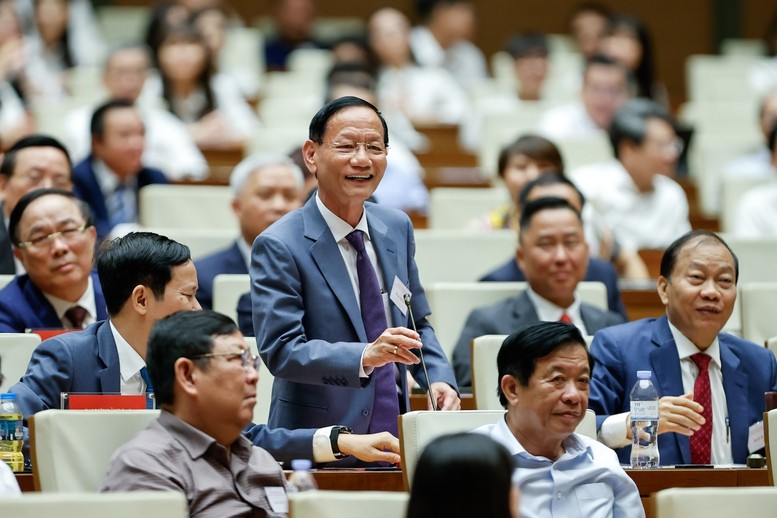
Remove barriers and the mindset of 'if you can't manage it, ban it'
The Prime Minister said that from the practical development of our country's private economy in recent years and international experience, the following lessons can be drawn:
Firstly, renewing thinking and unifying awareness of the position and role of the private economy as the most important driving force and main pillar of the national economy, creating high consensus in society and strong actions to support the development of the private economy.
Second, enhance the State's role in creating and guiding, strengthen leadership, direction, management, institutional building and implementation capacity, have breakthrough mechanisms and policies, remove all barriers and the mindset of "if you can't manage it, ban it" to develop the private economy, and promote cooperation between the State and the private sector.
Third, ensure that the private sector is treated fairly and equally with other economic sectors; have outstanding and breakthrough mechanisms, policies and solutions to unblock, mobilize and effectively use resources, especially for research and development, innovation and digital transformation; promote cutting, simplifying and reducing administrative procedure costs.
Fourth , prioritize and support large enterprises, pioneers in leading a number of key and important industries and fields; strongly promote the connection between domestic enterprises and FDI enterprises; support private enterprises to reach out to international markets and build international brands.
Fifth , focus on training and developing high-quality human resources, have outstanding remuneration policies to attract talents, especially in high-tech fields and new professions, creating a driving force to strongly promote the development of the private economy.
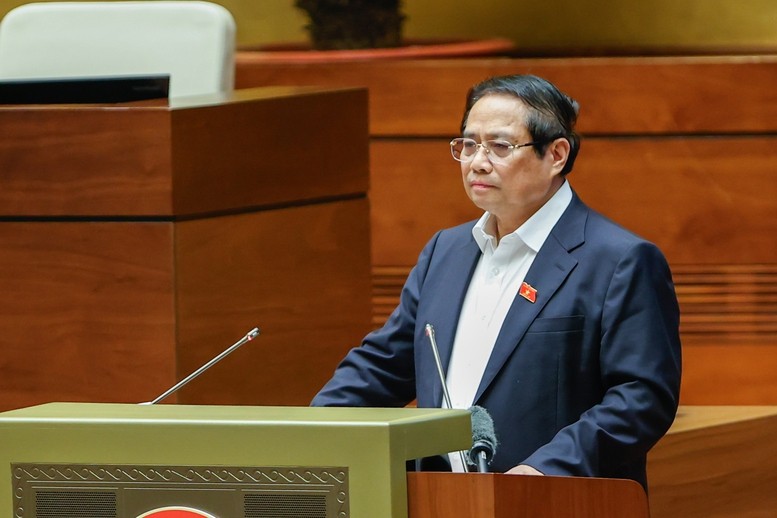
Analyzing the requirements for breakthrough policies for the development of the private economy , the Prime Minister pointed out the objective factors from the world situation and the subjective requirements. In the new context with many difficulties and challenges, there are also new opportunities and new chances for national development. In order to successfully implement the set socio-economic development goals and tasks, especially the two 100-year strategic goals, we need to renew our thinking, awareness and vision; take stronger and more drastic actions, unleash all driving forces for national development; especially the urgency to eliminate all prejudices, promote the role, create breakthroughs in the development of the private economy to strongly promote the cause of innovation, integration and development of the country in the new situation.
Implementing the direction of the Politburo, the Government promptly established a Steering Committee to develop the Project on private economic development headed by the Prime Minister; regularly sought opinions and received instructions from the Politburo, the Secretariat, especially direct instructions from the General Secretary; mobilized active participation and opinions from all levels, sectors, localities, experts, associations, and enterprises.
In a short period of time (2 months), the Politburo was submitted to issue Resolution No. 68-NQ/TW; the National Assembly was submitted to issue Resolution No. 198/2025/QH15 dated May 17, 2025 on a number of special mechanisms and policies for the development of the private economy; Resolution No. 138/NQ-CP dated May 16, 2025 on the Action Plan to implement Resolution 68-NQ/TW of the Politburo and Resolution No. 139/NQ-CP dated May 17, 2025 on the Plan to implement Resolution No. 198/2025/QH15 of the National Assembly.
Along with that, we are also carrying out a revolution in organizational structure, creating new development space, cutting down on intermediaries, strengthening the grassroots, cutting down on procedures, and shifting strongly from a passive state to proactively serving people and businesses.
Solve the most important and urgent problems
Regarding the main content of Resolution 68, the Prime Minister clearly stated the guiding viewpoints, goals, tasks, solutions and implementation organization.
The Prime Minister said that Resolution 68-NQ/TW sets out 5 breakthrough guiding viewpoints on the development of the private economy, of which the most prominent are:
(1) The private sector is the most important driving force of the national economy. The practice of innovation in our country and international experience show that this is the pioneering force promoting industrialization, modernization, economic growth, job creation, improving labor productivity, national competitiveness, and international integration.
(2) Developing a fast, sustainable, effective, and high-quality private economy is both a central and urgent task and a long-term strategic one. This is an objective necessity, in which private economy is the most important method to liberate productive forces, activate, mobilize, and effectively use all resources, especially among the people.
(3) Completely eliminate perceptions, thoughts, concepts, and prejudices about the private economy; consider entrepreneurs as soldiers on the economic front. Only then can we truly ensure that the private economy is equal to other economic sectors, especially in accessing resources.
(4) Create an open and transparent business environment, ensuring regional and global competitiveness; promote the spirit of entrepreneurship, legal enrichment, and contribution to the country. This is an issue of special significance, creating a solid foundation to promote strong development and promote the role of the private economy in participating in important and strategic tasks of the country, reaching regional and world levels.
(5) Strengthen the leadership role of the Party, the creation role of the State, taking enterprises as the center and subject; honoring, encouraging and developing a strong team of entrepreneurs. Thereby, contributing to promoting and developing the spirit of patriotism, national pride, and the desire to contribute of the business community to the revolutionary cause of the Party and the nation.
Believing that it is necessary to launch a nationwide movement to compete to get rich, serving the cause of building and defending the Fatherland, the Prime Minister emphasized that "the business world is a battlefield", and it is necessary to create motivation and inspiration for soldiers on the economic front to contribute to the country.
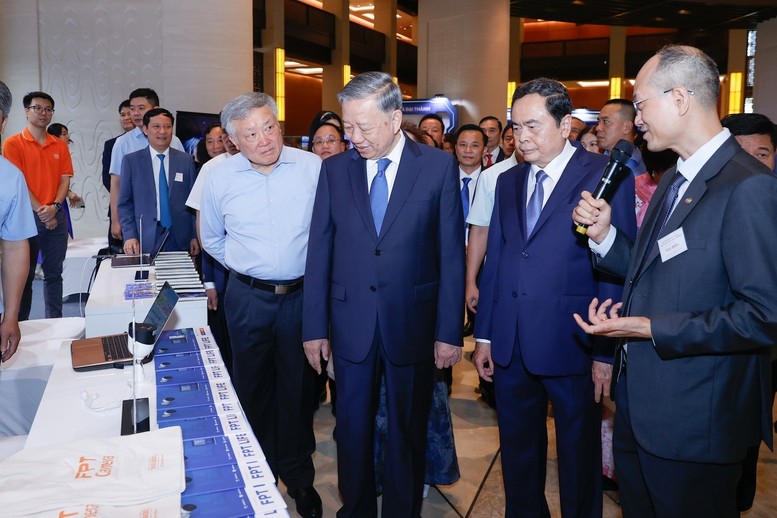

To achieve the goals set for 2030 and 2045, the Resolution sets out 8 groups of tasks and solutions demonstrating the spirit of innovation, breakthroughs, and strong reforms, ensuring adherence to 3 strategic breakthroughs (in institutions, human resources, infrastructure) and in the overall 04 important Resolutions of the Politburo, including: (1) Resolution 57-NQ/TW on breakthroughs in science and technology development, innovation and digital transformation; (2) Resolution 59-NQ/TW on international integration in the new situation; (3) Resolution 66-NQ/TW on innovation in law making and enforcement; (4) Resolution 68-NQ/TW on developing the private economy.
The Prime Minister said that the key content of the 8 groups of tasks and solutions is to solve the most important and urgent issues for the development of the private economy today. These are: (1) Innovation in thinking, awareness and action; (2) Reform and improve the quality of institutions; (3) Increase access to resources; (4) Promote science and technology, innovation, digital transformation; (5) Strengthen business connectivity; (6) Develop large private enterprises; (7) Support small, micro-small private enterprises, and business households; (8) Promote the role of entrepreneurs.
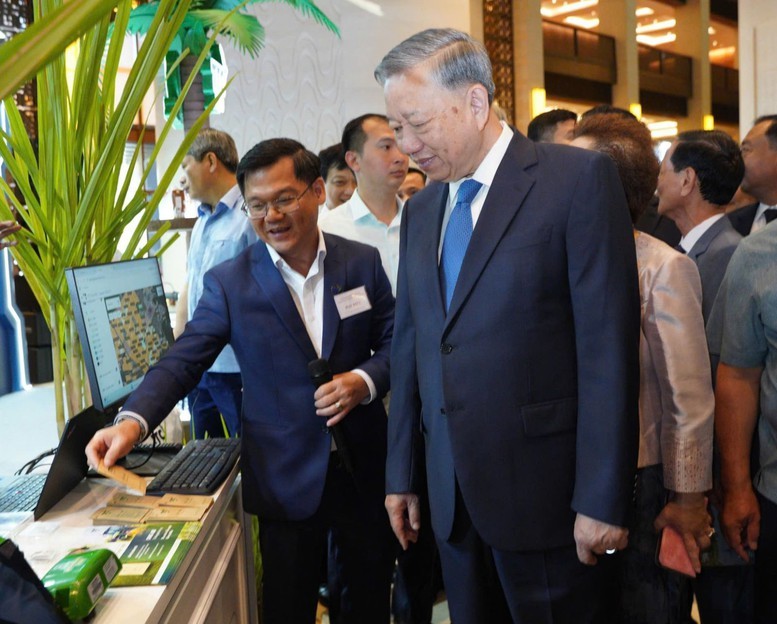
The first group, innovates thinking, has high unity in perception and action, arouses national belief and aspirations, creates new impulses and new momentum to develop the private economy.
The Prime Minister stated that this is the first and most important requirement, creating a premise for the development of the private economy; requiring media and press agencies to focus on improving the quality and effectiveness of information and propaganda (encouraging and spreading good models and good practices, encouraging the entrepreneurial spirit of enterprises and entrepreneurs; strictly prohibiting acts of harassment, negativity, and providing false information that affects enterprises and entrepreneurs).
Group 2: Promote reform, improve and enhance the quality of institutions and policies, effectively ensure and protect ownership rights, property rights, freedom of business, equal competition rights of private enterprises and ensure contract enforcement of private enterprises.
This group of tasks and solutions aims to thoroughly and effectively solve institutional problems, not allowing institutions to continue to be "bottlenecks of bottlenecks", but rather a driving force to strongly promote the development of the private economy. The spirit is to innovate the thinking of building and enforcing laws; eliminate administrative barriers, the "request - grant" mechanism, the "can't manage, ban" mindset; thoroughly overcome the contradictions, overlaps, and inconsistencies between ministries, branches, and localities; proactively create the most favorable institutional environment; focus on solving the core issues of ensuring ownership rights, freedom of business, property rights, equal competition rights, and contract enforcement; clearly distinguish criminal, administrative, and civil responsibilities to strengthen the trust of businesses and entrepreneurs, and promote the development of the private economy.
Regarding reform, improving the quality of institutions and policies, perfecting the legal system, removing barriers to market access; creating all favorable conditions in handling administrative procedures. Shifting from public administration, mainly management to service and development creation, focusing on people and businesses. Not discriminating between the private economy and other economic sectors in mobilizing, allocating and using resources; perfecting institutions, having special mechanisms and policies to promote the development of the private economy.
Regarding the clear distinction between criminal and administrative and civil responsibilities, the Resolution clearly states: Ensure the principle that when handling violations and civil and economic cases, priority should be given to applying civil, economic and administrative measures first, allowing proactive remedy of violations and damages. In cases where the practical application of the law may lead to criminal prosecution or no criminal prosecution, criminal prosecution should be resolutely not applied. In cases where criminal prosecution is required, priority should be given to measures to remedy economic consequences first and this should be an important basis for considering subsequent handling measures. Do not retroactively apply legal provisions to handle cases that are unfavorable to enterprises. Ensure the principle of presumption of innocence during the investigation and trial of cases. Ensure the value of sealing, attachment, temporary detention and freezing corresponds to the expected consequences of damage in the case. Clearly distinguish between legally formed assets and assets obtained from violations of the law and other assets related to the case; minimize impact on production and business activities.
Group 3 is to facilitate private enterprises to access resources of land, capital, and high-quality human resources. According to the Prime Minister, this is also a new point of the Resolution, which provides specific solutions to existing problems.
Accordingly, increasing opportunities to access land and production and business premises for private enterprises; promoting and diversifying capital sources for private enterprises; improving the quality of human resources for private enterprises.
Group 4 is promoting science and technology, innovation, digital transformation, green transformation, effective and sustainable business in the private economy, with breakthrough mechanisms and policies.
For example, calculating expenses when determining taxable income for corporate income tax for research and development activities is equal to 200% of actual expenses; deducting a maximum of 20% of taxable income for corporate income tax to establish a fund for science, technology, innovation, and digital transformation development; using the fund to self-deploy or order external research and development according to the product contract mechanism.
Group 5 is to strengthen connections between private enterprises, private enterprises with state-owned enterprises and FDI enterprises.
Group 6 is to form and rapidly develop medium and large enterprises, regional and global economic groups. Diversify and improve the effectiveness of forms of cooperation between the State and the private sector through the models of "public leadership - private administration", "public investment - private management", "private investment - public use".
Building and implementing a program to develop 1,000 typical and pioneering enterprises in science and technology, innovation, digital transformation and green transformation; Program to reach out to international markets (Go Global)...
Group 7 is to provide practical and effective support to small, micro and household businesses.
In particular, effectively implement the National Financial Inclusion Strategy, especially for small and micro enterprises, business households, prioritizing business owners, business households who are young people, women, vulnerable groups, ethnic minorities, mountainous, border and island areas and inclusive business models, creating social impact.
Group 8 is to promote business ethics, promote social responsibility, strongly promote the entrepreneurial spirit, and create all favorable conditions for businessmen to participate in national governance.
Accordingly, honor, commend and reward typical, advanced entrepreneurs and enterprises that do effective and sustainable business, fulfill social responsibilities well and actively participate in community activities.
Establish a close, substantive, sharing, open and sincere relationship between Party committees and authorities with private enterprises; promote the role of giving opinions and criticizing policies of enterprises and business associations. Build the Ho Chi Minh Communist Youth Union and develop the Party in the private enterprise and business sector.
Regarding implementation , the Politburo assigned specific tasks to the National Assembly Party Committee, the Government Party Committee, the Central Party Committees, the Party Committees of ministries, ministerial-level agencies, agencies directly under the Government, the Supreme People's Court, the Supreme People's Procuracy, the provincial and municipal Party Committees, the Party Committees directly under the Central Party Committee of the Fatherland Front, and the Central mass organizations in implementing Resolution 68-NQ/TW.
Regarding the Government's Action Plan, the Prime Minister said that the Plan was issued to concretize, resolutely, synchronously and effectively implement the groups of tasks and solutions in Resolution 68-NQ/TW of the Politburo. The motto is to focus on implementation with high determination, great effort, decisive action, clearly identifying the focus and key points. Assigning tasks must be specific and clear for ministries, branches and localities to implement with the spirit of "6 clear: clear people, clear work, clear responsibility, clear authority, clear time, clear results".
Adhering to the 5 guiding viewpoints, specific goals to 2030, vision to 2045 and 08 groups of tasks, main solutions according to Resolution No. 68-NQ/TW, the Government's Action Program sets out 8 groups of tasks with 117 specific tasks, assigned to each ministry, branch, and locality to preside over or coordinate implementation according to functions, tasks, and powers, with specific deadlines and results.
The Prime Minister also informed that the National Assembly issued Resolution No. 198/2025/QH15 dated May 17, 2025 on a number of special mechanisms and policies for the development of the private economy with a number of main contents: On improving the business environment; on support for access to land and production and business premises; on financial support, credit and public procurement; on support for science, technology, innovation, digital transformation and human resource training; on support for the formation of medium and large enterprises and pioneering enterprises; on implementation provisions.
On May 17, 2025, the Government promptly issued Resolution No. 139/NQ-CP on the Plan to implement Resolution No. 198/2025/QH15 of the National Assembly, assigning specific tasks with specific deadlines to ministries, agencies and localities to focus on implementation and promote effectiveness right from the time of issuance.
Goals according to Resolution 68 of the Politburo:
(1) By 2030:
- The private economy is the most important driving force of the national economy; it is a pioneering force in the development of science and technology, innovation and digital transformation, contributing to the successful implementation of the goals of Resolution No. 57-NQ/TW of the Politburo.
- There are 2 million enterprises operating in the economy, 20 enterprises operating/thousand people; there are at least 20 large enterprises participating in the global value chain.
- Average growth rate is about 10-12%/year, higher than the growth rate of the economy; contributing about 55-58% of GDP, 35-40% of total state budget revenue; creating jobs for about 84-85% of total labor force; labor productivity increases on average about 8.5-9.5%/year.
- Level, technology capacity, innovation, digital transformation are among the top 3 ASEAN countries and top 5 Asian countries.
(2) Vision to 2045:
Vietnam's private economy develops rapidly, strongly, sustainably, proactively participating in the global production and supply chain; has high competitiveness in the region and internationally; strives to have at least 3 million enterprises operating in the economy by 2045; contributing over 60% of GDP.
Source: https://baolaocai.vn/thuong-truong-la-chien-truong-can-tao-dong-luc-truyen-cam-hung-cho-doanh-nhan-va-phat-dong-toan-dan-thi-dua-lam-giau-post401978.html



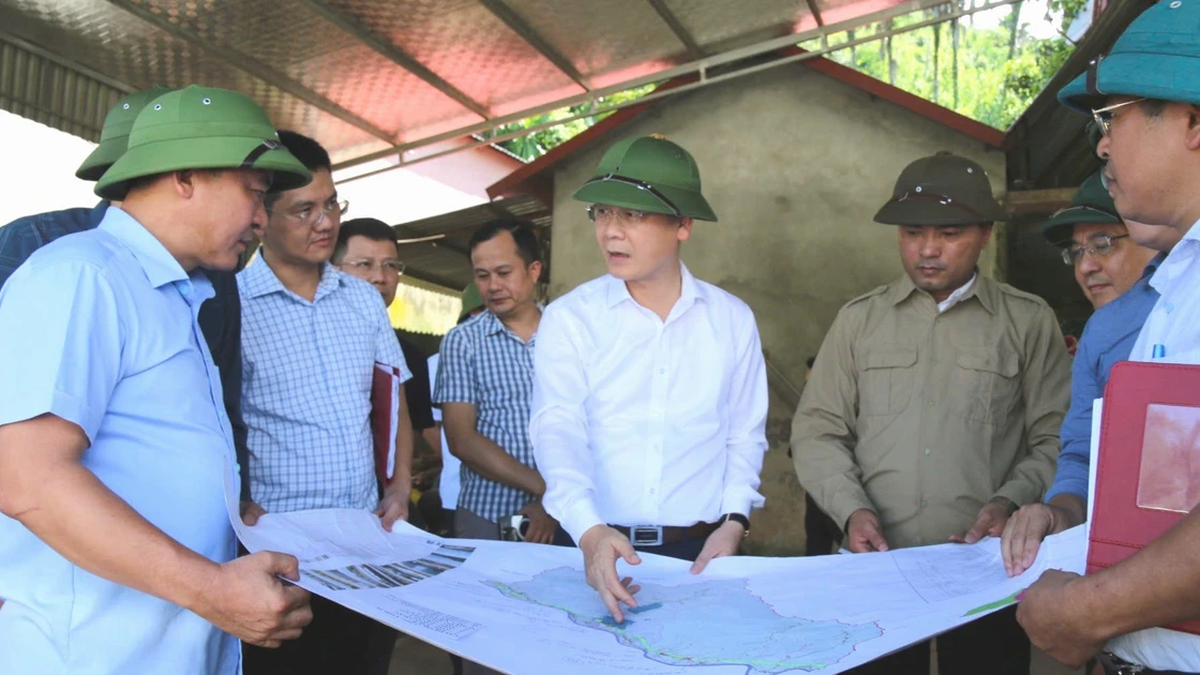


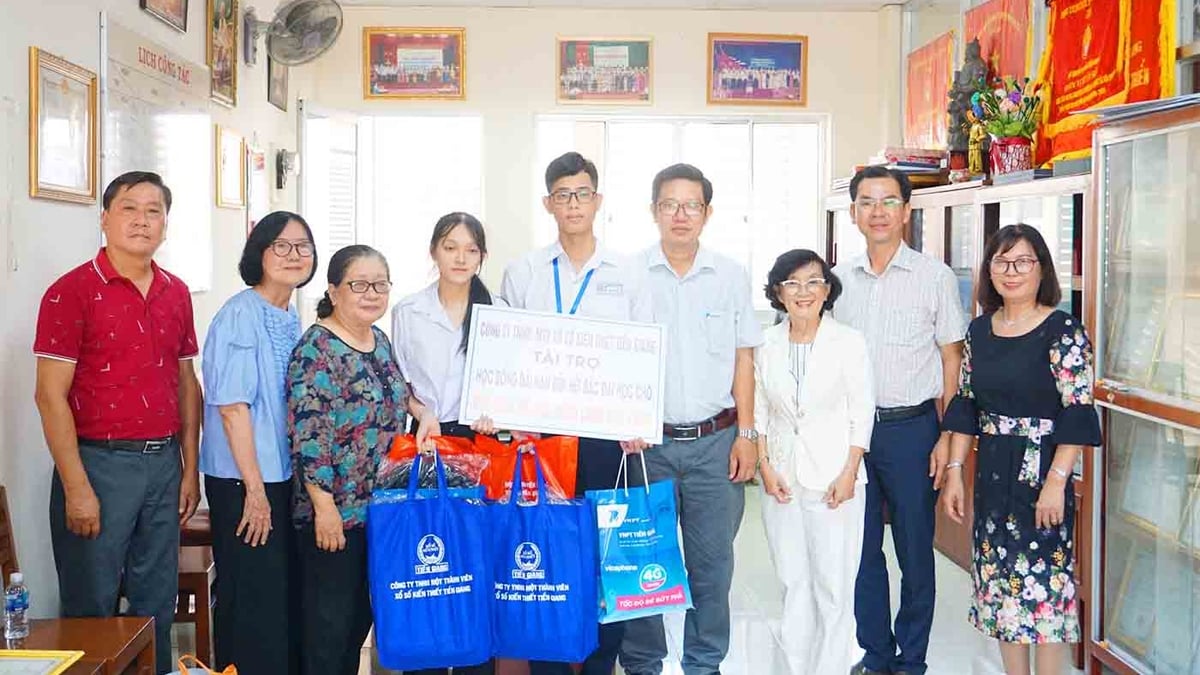







































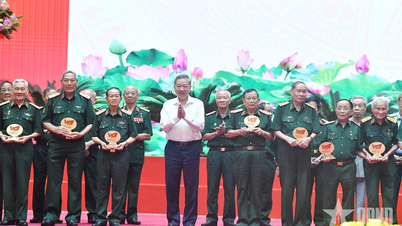








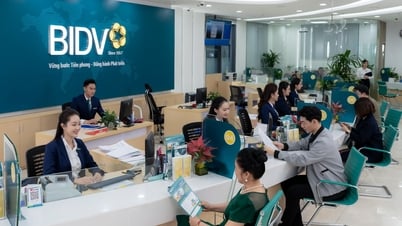

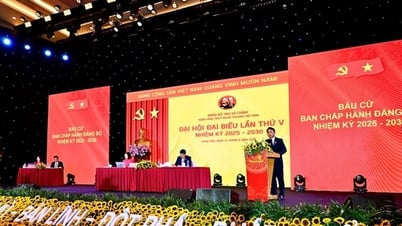









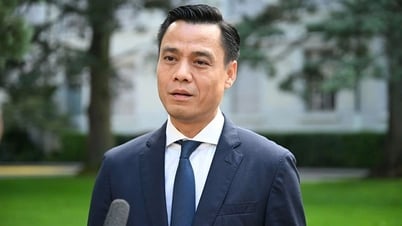


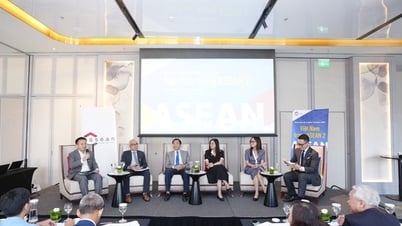





























Comment (0)